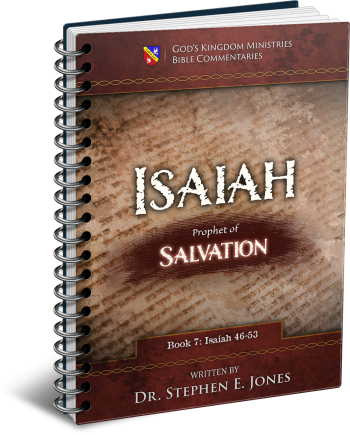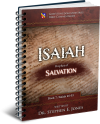Latest Posts
View the latest posts in an easy-to-read list format, with filtering options.

Isaiah is the prophet of Salvation. He is also known as the truly "Universalist" prophet, by which is meant that He makes it clear that salvation is extended equally to all nations and not just to Israel. He lived to see the fall of Israel and the deportation of the Israelites to Assyria, and he prophesied of their "return" to God (through repentance). He is truly a "major prophet" whose prophecies greatly influenced the Apostle Paul in the New Testament.
Category - Bible Commentaries

Isaiah did not divide his writings into chapters and verses. The divisions that now appear in our Bibles were made by the Archbishop of Canterbury, Stephen Langton (1150-1228). His chapter divisions did not always make sense. Instead of beginning Isaiah 53 at the place where we see it in our Bibles, he should have begun at Isaiah 52:13, for this is where Isaiah himself began to describe the Suffering Messiah.
Isaiah 52:13, 14 begins this revelation, saying,
13 Behold, My Servant will prosper [sakal, “to look at, have insight, be prudent, wise, understanding, so as to be successful”], He will be high [ruwm] and lifted up [nasa] and greatly exalted. 14 Just as many were astonished [shamam, “stunned”] at you, My people, so His appearance was marred more than any man and His form more than the sons of men.
The prophet begins his description of the Messiah by telling us that he will “prosper.” The Hebrew word is sakal, which indicates that He was to have great insight and understanding and would therefore prosper in His work and mission. Christ knew His calling and embraced the cross in order to be successful in saving the world.
Remarkably, the prophet describes that mission by saying, “He will be high and lifted up.” This obviously has a double meaning. It can refer to being exalted in power and majesty, such as when he saw God in Isaiah 6:1,
1 In the year of King Uzziah’s death, I saw the Lord sitting on a throne, lofty [ruwm] and exalted [nasa], with the train of His robe filling the temple.
When Jesus prophesied of His death on the cross, He said in John 12:32, 33,
32 “And I, if I am lifted up from the earth, will draw all men to Myself.” 33 But He was saying this to indicate the kind of death by which He was to die.
No doubt Jesus was referencing Isaiah 52:13. At the time, no one suspected that He was speaking of being lifted up on the cross. His manner of death was obscured by the double meaning of the words. The people thought that He was speaking of His exaltation to the throne as the Messiah. And certainly, He was indeed speaking of such glory, for later, after alarming them with His talk of impending death, He tried to comfort His disciples by telling them in John 17:5,
5 “Now, Father, glorify Me together with Yourself with the glory which I had with You before the world was.”
The fact is that He was literally “lifted up” on the cross, but this was also His exaltation into glory. Both of these ideas were prophesied by Isaiah and fulfilled in Christ, though few would have known ahead of time how these things would come about. Even the disciples themselves, after spending much time with Him, were shocked to learn the reality of this prophecy.
Yet Jesus did indeed have the sakal, the insight, the understanding, and the prudence to know what Isaiah was saying. He knew from Isaiah 53 that He would have to die as the Lamb of God to take away the sin of the world.
In Isaiah 52:14 we read, “Just as many were astonished at you, My people.” The phrase, “My people,” is not in the original text but is added by the NASB translators. The KJV omits this phrase, telling us that the people were astonished “at Thee,” that is, at the Messiah.
So the question is this: Who astonished them? Was it “My people” or the Messiah Himself? The fulfillment included both of them. First, Jesus’ crucifixion was astonishing, not that it was unusual for men to be crucified, but that, in order to accomplish His work, the Messiah would have to be crucified. That was a stunning revelation, first to the disciples and later to the world.
At the same time, Jesus prayed that the disciples would come into full unity with Him and with each other. John 17:22, 23 says,
22 The glory which You have given Me I have given to them, that they may be one, just as We are one; 23 I in them and You in Me, that they may be perfected in unity, so that the world may know that You sent Me, and loved them, even as You have loved Me.
The common view in Jesus’ time was that the Messiah would do miracles to feed the people bread from heaven, that He would overthrow Roman rule, and that He would exalt the priestly class in the government of His kingdom. Few, if any, believed that the Messiah’s governing body would have to crucify their “old man” in order to be raised into glory as a “new man.”
That too was a stunning development, all bound up in Isaiah’s prophecy in Isaiah 52:13, 14. In other words, no one really knew the divine plan in those days, except for the Messiah Himself, who was endowed with insight (sakal) and understanding that ensured complete success.
Afterward, the disciples carried the gospel to the ends of the earth, having been transformed by the renewing of their minds (Rom. 12:2). They understood that they too had to be “crucified with Christ” (Gal. 2:20) in order to be in unity with Him in His resurrection and glory.
“So His appearance was marred more than any man, and His form more than the sons of men” (Isaiah 52:14). When men were crucified as blasphemers, those who were passing by were expected to participate in the execution to show their agreement with the judgment of God. Hence, when Jesus was crucified, the people would have cast stones at Jesus, customarily aiming at His face.
Hence, Isaiah tells us that “His appearance was marred.” The KJV reads, “His visage was so marred.” After being stoned by many people, Jesus’ face was unrecognizable.
The result of such suffering is found in Isaiah 52:15, which says,
15 Thus He will sprinkle [naza, “sprinkle, exult, fill with joy”] many nations, kings will shut their mouths on account of Him; for what had not been told them they will see, and what they had not heard they will understand.
This prophecy was fulfilled after the day of Pentecost during Philip’s evangelistic meetings in Samaria (Acts 8). Philip was instructed by an angel to walk to Jerusalem and to take the road south from there toward Gaza (Acts 8:26). Along the road, he encountered an Ethiopian eunuch from the royal court of Queen Candace, who apparently was a convert to Judaism. The eunuch was returning to Ethiopia. We read in Acts 8:29-33,
29 Then the Spirit said to Philip, “Go up and join this chariot.” 30 Philip ran up and heard him reading Isaiah the prophet, and said, “Do you understand what you are reading?” 31 And he said, “Well, how could I, unless someone guides me?” And he invited Philip to come up and sit with him. 32 Now the passage of Scripture which he was reading was this: “He was led as a sheep to slaughter, and as a lamb before its shearers is silent, so He does not open His mouth. 33 In humiliation His judgment was taken away [i.e., His rights were violated, no justice]; who will relate His generation? For His life is removed from the earth.”
As we see so often, God had arranged the circumstance so that Philip encountered the eunuch just as he was reading Isaiah 53—which, as we have seen already, began with Isaiah 52:13. No doubt the eunuch had read the passage from the beginning, but he had not understood what he was reading.
But Philip understood it, for the lifting up of the Messiah had been revealed to him earlier. So also we find that many people even today read the Scriptures with little or no understanding and are in need of a guide to explain how the prophecies were to be fulfilled. Acts 8:35, 36 then says,
35 Then Philip opened his mouth, and beginning from this Scripture he preached Jesus to him. 36 As they went along the road, they came to some water; and the eunuch said, “Look! Water! What prevents me from being baptized?”
Philip then baptized the eunuch to fulfill the prophecy in Isaiah 52:15, “He will sprinkle many nations.” In the law of sprinkling, we read in Num. 19:13, “Because the water for impurity was not sprinkled on him, he shall be unclean.” Heb. 10:22 says,
22 Let us draw near with a sincere heart in full assurance of faith, having our hearts sprinkled clean from an evil conscience and our bodies washed with pure water.
The eunuch, therefore, was baptized by sprinkling to fulfill the law and Isaiah’s prophecy. Yet the Hebrew word naza has a double meaning. It means “to sprinkle” and also “to exult or rejoice.” And so we read in Acts 8:39,
39 When they came up out of the water, the Spirit of the Lord snatched Philip away; and the eunuch no longer saw him but went on his way rejoicing.
The eunuch was sprinkled and “went on his way rejoicing.”
The baptism of the eunuch set a prophetic pattern for the fulfillment of Isaiah’s prophecy in the aftermath of the Messiah’s suffering and death. The eunuch was from Ethiopia, one of the “many nations” that were to be baptized after expressing their faith in the gospel of Christ. By understanding the lifting up (nasa) of Christ on the cross, the eunuch was then in a position to rejoice (naza).